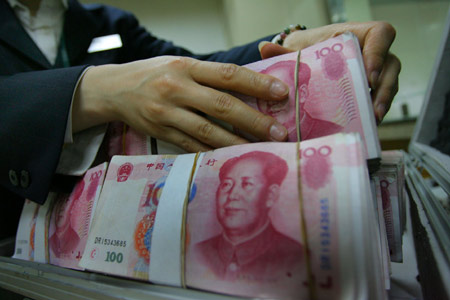Economy
Time for RMB appreciation?
(China Daily)
Updated: 2010-06-09 10:11
 |
Large Medium Small |
|
 |
|
An employee counts banknotes at a China Minsheng Banking Corp branch in Nanjing, Jiangsu province.[China Daily] |
Editor's Note: To revalue the yuan or not? This has been one of the hottest topics for the past decade and it has become an issue not only for Chinese policymakers but other governments around the world. The upcoming G20 summit of leaders from major developed and developing economies and the worsening of the European sovereign debt crisis have complicated the discussion of the yuan's appreciation, with Chinese economists divided on the timing of the process. While some argue that appreciation would do more harm than good, others urge the opportunity be seized to accelerate the process of making the yuan fully convertible.
Financial experts debate the pros and cons of calls for China to revalue its currency

It is not time for yuan appreciation. Although the leaders at the upcoming G20 summit are expected to discuss the issue, it should be up to China to decide.
Yuan appreciation would benefit China's imports of products from machinery to resources, but the benefit would be limited compared with the damage to the overall economy. China has, for example, suffered from overcapacity in sectors such as iron and steel, and cheaper imports as a result of yuan appreciation would only worsen the situation.
Yuan appreciation will benefit rich people in China, but it will do little to help improve the livelihoods of the poor. It would only widen the gap, which would contribute to social problems.
If the yuan appreciates against the dollar, expectations of further gains in the value of the yuan would lead to increased capital inflows, which would bring financial instability and would endanger China's financial security.
What has largely been ignored by many people is that yuan appreciation would facilitate imports of agricultural products, which would be disastrous for China's more than 500 million farmers. Although the country's entry into the World Trade Organization did not have a major impact on domestic farming, yuan appreciation would have a more adverse effect on the industry, leading to more job losses.
China must make relevant policies based on its own well-being, not others' directions.

The sharp decline of the euro against the dollar and other major currencies means that the yuan has effectively appreciated. Many people no longer expect the yuan to resume its appreciation against the dollar, at least not in the next few months. We have also adjusted downward our expectations of yuan appreciation against the dollar, to about 3 to 4 percent this year. Moreover, if European markets do not calm down in the near future, then concern over a more serious financial contagion could take the yuan move off the table.
However, as long as the markets calm down and the euro stabilizes, we think China could still start to de-link the yuan from the dollar. The move would most likely be a return to some sort of a basket with a widening trading band against the dollar. Initially we expect the yuan to appreciate against the dollar, but the increased flexibility could allow the exchange rate to move both ways, giving China more room to maneuver in the future.
A recent news report about China reviewing its euro debt holdings prompted market moves and the Chinese government's assurance of its faith in the euro and European government bonds. We believe that if Asian central banks including China hold on to their euro holdings but reduce their future purchases, the euro would weaken still further.

When China and the United States clash over yuan appreciation, some analysts have cited the Plaza Accord of 1985 as a warning to China against revaluation.
At that time, Western countries joined together to force Japan to raise the value of the yen and finally caused its domestic economic bubbles to burst. Then Japan fell into recession for over 10 years and is still struggling to recover.
The so-called "lost decade" led many to suspect that the US is readily pushing China on the currency issue to suppress the rise of the nation. China should firmly refuse to revalue the yuan to avoid repeating Japan's tragic mistakes.
However, Takatoshi Ito, a well-known Japanese economist, pointed out that the major reason for the fall of Japan's economy was that the bubbles burst too abruptly; at the beginning of bubble formation, the Japanese government didn't address it properly and in a timely manner, sowing the seeds for an irreversible future disaster.
|
||||
But will disputes over the trade deficit be solved if the yuan is appreciated? The answer is clearly no. The solution to the problem lies with the implementation of significant and sustained changes in the competitiveness of Chinese products in relation to those of other countries.



